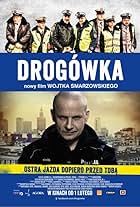IMDb RATING
6.5/10
3.4K
YOUR RATING
The depiction of the life of Nobel Peace Prize winner and founder of Poland's Solidarity movement, Lech Walesa, as events in the 1970s lead to a peaceful revolution.The depiction of the life of Nobel Peace Prize winner and founder of Poland's Solidarity movement, Lech Walesa, as events in the 1970s lead to a peaceful revolution.The depiction of the life of Nobel Peace Prize winner and founder of Poland's Solidarity movement, Lech Walesa, as events in the 1970s lead to a peaceful revolution.
- Awards
- 3 wins & 6 nominations total
- Director
- Writer
- All cast & crew
- Production, box office & more at IMDbPro
Featured reviews
a portrait. a homage. a form of definition of a struggle. at the first sigh. in fact, a film about an ordinary man who has the chance to be part of a great change. the film represents the mark of Andrzey Wayda. the technique, the construction of story, references to his filmography, the tone, the dialogues, the spirit of wake up of a profound Poland . it is not a biopic but a testimony. it is not a demonstration but only an exercise to propose a slice of recent history for understand a cause. it is easy to define it as an eulogy. in fact, it is only a tool for explain. for describe. for impose the final part of a project who explains Poland and its fight under communism. a high ambition result could be unclear for viewers. and Wales is not exactly an exception. but a good support for discover Wajda films. for search the trajectory of Lech Walesa. for remind the recent past of Poland. and the values who remain its roots.
The formal opening of the 25th Polish Film Festival in America played to a packed house. Dignitaries, filmmakers, and sponsors from Chicagoland's Polish community and from Poland lent an air of glamour to opening night, as movie fans eagerly awaited the screening of legendary Polish director Andrzej Wajda's "Walesa: Man of Hope." The master film director himself was given the festivals "Wings" award for lifetime achievement in cinema, and he sent a video greeting that served as the perfect introduction to the film.
An Oscar winner and frequent nominee in the foreign language film category, 87-year-old Wajda said that his latest film completes a trilogy begun in 1977 with "Man of Marble" and continued in 1981 with "Man of Iron." An unfiltered portrayal of Lech Walesa, the Polish shipyard worker whose leadership led to the fall of the Soviet Union, the two-hour film stars Robert Wieckiewicz, who transforms himself into a startlingly convincing representation of the leader of the Solidarity movement. Wajda masterfully mixes news footage from the period with the fictionalized version of the Nobel Peace Prize winner's life and times. This is a compelling film that neither idolizes nor demonizes Walesa, who ultimately became president of Poland but soon tumbled from grace and revealed himself to be something less than a giant among men. It is the story of a man who fulfilled his destiny and changed the world through determination and a gift for tough, direct speech.
An Oscar winner and frequent nominee in the foreign language film category, 87-year-old Wajda said that his latest film completes a trilogy begun in 1977 with "Man of Marble" and continued in 1981 with "Man of Iron." An unfiltered portrayal of Lech Walesa, the Polish shipyard worker whose leadership led to the fall of the Soviet Union, the two-hour film stars Robert Wieckiewicz, who transforms himself into a startlingly convincing representation of the leader of the Solidarity movement. Wajda masterfully mixes news footage from the period with the fictionalized version of the Nobel Peace Prize winner's life and times. This is a compelling film that neither idolizes nor demonizes Walesa, who ultimately became president of Poland but soon tumbled from grace and revealed himself to be something less than a giant among men. It is the story of a man who fulfilled his destiny and changed the world through determination and a gift for tough, direct speech.
At the outset, Walesa: Man of Hope is not an ordinary film. It is one of the best examples of Polish director Mr.Andrzej Wajda's unending talent and enormous cinematographic vision. The best thing about this film is how does one dramatize real life incidents to create a biopic which is both entertaining and rich in details. It is because of this quality that the film is so tightly structured that while watching it, one doesn't even realize how 128 minutes have passed. The film finds its origin in a detailed interview conducted by noted Italian journalist Oriana Fallaci. She takes the help of an interpreter (Italian-Polish) in order to ask important questions to Mr.Lech Walesa related to his turbulent life. What is of interest is that not only she asks pertinent questions but also receives candid answers. The manner in which these questions and answers are represented on the screen speak volumes about Mr.Andrzej Wajda's method of filmmaking. He goes to a relatively distant past to reveal unknown facets about a man who would become hugely famous after a decade. Polish actor Robert Wieckiwicz is extremely ideal in his role as Lech Walesa-one of the most famous Polish citizens whose name is known even to many young schoolchildren all over the world.Lastly,Walesa:Man of hope is not a film.It is pure history in making about a person who changed the destiny of a whole nation.
With all respect to Walensa - I honestly think this movie would work better as a comedy. The subplot with Walesna wife as well some comedic one-liners are the most enjoyable things about this movie.
There's just isn't much to it. The movie spent more time "talking" about what great man Walensa is rather then "SHOWING" it. I think they did an excellent job of showing what colorful character he is but at the same times movie doesn't spent much time to have you feel what struggles hes going trough. His just "There". It simply lack emotions and there is something anti-climatic about the way it ends.
When the movie ended I truly felt I've only seen 1/3 of a movie. Some good moments and an excellent cast but as a whole nothing special...
There's just isn't much to it. The movie spent more time "talking" about what great man Walensa is rather then "SHOWING" it. I think they did an excellent job of showing what colorful character he is but at the same times movie doesn't spent much time to have you feel what struggles hes going trough. His just "There". It simply lack emotions and there is something anti-climatic about the way it ends.
When the movie ended I truly felt I've only seen 1/3 of a movie. Some good moments and an excellent cast but as a whole nothing special...
WALESA: MAN OF HOPE tells the story of the rise and rise of Lech Walesa, who led the Solidarity movement in the Seventies and Eighties, and helped bring about a revolution in Poland. The story is a familiar one of an iron-willed person whose commitment to the cause overrides everything - even his family. Despite being jailed on numerous occasions, and threatened with everything, including lifetime imprisonment, Walesa (Robert Wieckiewicz) remains sternly committed to his cause, and thereby helps bring about change in a rapidly disintegrating communist regime. Wieckiewicz's performance is just wondrous; he remains utterly convincing in the role, showing the weak as well as the strong sides of the character as he tries to bring up a family of six children while showing loyalty to his fellow-workers. Structurally speaking, Wajda's film follows a familiar path; we are encouraged to sympathize with Walesa, even if we doubt his methods sometimes, as someone who genuinely fought on behalf of the workers he tried to represent. For those unacquainted with the nuances of Polish history during this period, WALESA: MAN OF HOPE offers a useful lesson. Its message remains as significant today as it did three decades ago; even today, there are those - in the Soviet Union in particular - who are resisting the authorities' attempts to suppress them for similar motives. WALESA: MAN OF HOPE offers hope for them as well as for anyone pursuing the cause of freedom.
Storyline
Did you know
- TriviaOne of the contenders to play the part of Oriana Fallaci was Italian star Monica Bellucci. Her salary was, however, too high for the producers so they decided to cast Maria Rosaria Omaggio instead.
- SoundtracksKocham wolnosc
Written by Bogdan Lyszkiewicz
Performed by Chlopcy Z Placu Broni
- How long is Walesa: Man of Hope?Powered by Alexa
Details
Box office
- Budget
- €3,500,000 (estimated)
- Gross worldwide
- $5,250,588
- Runtime2 hours 7 minutes
- Color
- Aspect ratio
- 2.35 : 1
Contribute to this page
Suggest an edit or add missing content


































